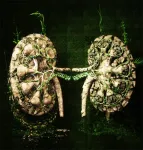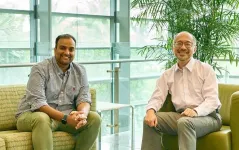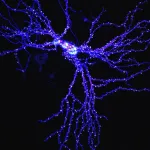(Press-News.org) A U.S.-Canadian research collaboration led by Vanderbilt University Medical Center has identified common, age-associated changes in the blood as a risk factor for acute kidney injury (AKI), which occurs in more than 1 in 5 hospitalized adults worldwide.
This discovery, reported in the journal Nature Medicine, could open the door to new, more effective treatments for AKI and a way to prevent its progression to end-stage renal disease requiring kidney dialysis.
The focus of this investigation was clonal hematopoiesis of indeterminate potential (CHIP), somatic (noninherited) mutations in blood stem cells that can trigger explosive, clonal expansions of abnormal cells.
CHIP, which affects 10-20% of people ages 65 and older, is associated with an estimated 40% greater risk of death from cardiovascular, lung and liver disease, and other inflammatory conditions. This age group is also especially vulnerable to AKI.
“In addition to known causes for AKI, identification of an association with CHIP provides new insight into the increased risk and underlying mechanisms for the development of AKI among the older population,” said Raymond Harris, MD, co-corresponding author of the paper with Alexander Bick, MD, PhD.
“We commonly think about how a chronic inflammation caused by CHIP can cause chronic diseases, but I was quite surprised at the effect CHIP had on an acute inflammation,” Bick added.
Bick, an assistant professor of Medicine in the Division of Genetic Medicine, has pioneered methods for determining the presence of CHIP and the mechanisms by which it leads to disease.
Harris, the Ann and Roscoe R. Robinson Professor of Medicine, and director of research in the Division of Nephrology and Hypertension, is internationally known for his investigations of acute and chronic renal injury.
Researchers from Canada and across the United States contributed to the study, which was supervised by Bick, Harris and Cassianne Robinson-Cohen, PhD, associate professor of Medicine at VUMC.
The study was led by first author Caitlyn Vlasschaert, MD, a resident physician in Medicine at Queens University in Kingston, Ontario, Canada, who was previously a visiting research scholar at VUMC.
The researchers first showed that CHIP was associated with AKI in a meta-analysis of three population-based cohorts totaling more than 440,000 individuals from the UK (United Kingdom) Biobank, and two long-running studies in the United States.
The CHIP-AKI association was more pronounced in patients who required dialysis and in individuals with mutations other than in the DNMT3A gene, including the Tet2 and Jak2 genes.
Pursuing this finding, the researchers created mouse models of CHIP in which both Tet2 and Jak2 were mutated. They observed more severe AKI, greater infiltration of pro-inflammatory macrophages, a type of immune cell, in the kidneys, impaired recovery from AKI, and greater post-AKI fibrosis, or scarring.
These results suggest that CHIP inhibits recovery from AKI by inducing a pro-inflammatory response by mutant, infiltrating macrophages. It therefore may be possible to reduce this risk by targeting elements of the innate immune system that initiate and fan the flames of inflammation in the kidney, the researchers concluded.
“It was a privilege to closely collaborate with Dr. Harris’s research group on this effort,” Bick said. “It was remarkable to see how well our biobank scale observations were recapitulated by Dr. Harris’s mechanistic experiments.”
Other VUMC co-authors of the paper were Jianchun Chen, MD, Elvis Akwo, MD, MS, Alyssa Parker, Hannah Poisner, Shirong Cao, MD, PhD, Ming Jiang, MD, PhD, Yinqiu Wang, PhD, Aolei Niu, Edward Siew, MD, MSCI, Joseph Van Amburg, Ming-Zhi Zhang, MD, MSc.
This work was funded in part by a National Institute of Diabetes and Digestive and Kidney Diseases grant, R01DK132155, and by the PSI Foundation, the Canadian Institute of Health Research, and the German Research Foundation.
Additional funding was provided by the National Heart, Lung, and Blood Institute, National Institute of Neurological Disorders and Stroke, and the National Institute on Aging of the National Institutes of Health.
END
Blood mutations increase risk for acute kidney injury: study
2024-03-07
ELSE PRESS RELEASES FROM THIS DATE:
MPFI establishes its first international partner group
2024-03-07
The Max Planck Florida Institute for Neuroscience will establish its first International Partner Group in India. Dr. Anant Jain, a former MPFI scientist in the lab of Dr. Ryohei Yasuda, will begin his own research group at CHINTA (Centres for High Impact Neuroscience and Translational Applications), TCG Centres for Research Education Science and Technology (CREST).
“I am thrilled to head the Max Planck Partner Group, which will create a formal channel of collaboration between my new group and the experts at MPFI. This partnership will help launch my research program in India,” says Dr. Jain.
The Max Planck Partner Group program aims to ...
CHOP researchers find pre-existing mental health diagnoses may prolong time to recovery from concussion
2024-03-07
Philadelphia, March 7, 2024 – Researchers from the Minds Matter Concussion Program at Children’s Hospital of Philadelphia (CHOP) found that youth with pre-existing mental health diagnoses experienced a greater burden from emotional symptoms after concussion, as well as a prolonged time to recovery. Importantly, the study was the first of its kind to find a “dose-response” effect--that a greater number of mental health diagnoses was associated with increased emotional symptoms after concussion and a longer recovery. This finding suggests that addressing pre-existing mental ...
UT Health San Antonio receives $16.4 million from CPRIT over six months, adding transformative expertise, bolstering cancer research
2024-03-07
SAN ANTONIO, March 7, 2024 – The University of Texas Health Science Center at San Antonio (UT Health San Antonio) has secured approximately $16.4 million in funding from the Cancer Prevention and Research Institute of Texas the past six months, attracting three top cancer researchers and advancing child and adolescent cancer research.
A primary driver of San Antonio’s leading $44.1 billion health care and biosciences sector, UT Health San Antonio is the largest academic research institution in South Texas with an annual research portfolio of $413 million, and accounts for more than 70% of National Institutes of Health research funding to all institutions locally.
Simon ...
Current state of dermatology mobile applications with AI features
2024-03-07
About The Study: This scoping review determined that although artificial intelligence (AI) dermatology mobile apps hold promise for improving access to care and patient outcomes, in their current state, they may pose harm due to potential risks, lack of consistent validation, and misleading user communication. Addressing challenges in efficacy, safety, and transparency through effective regulation, validation, and standardized evaluation criteria is essential to harness the benefits of these apps while minimizing risks.
Authors: Veronica Rotemberg, M.D., Ph.D., of Memorial Sloan Kettering Cancer Center in New York, and Associate Editor, JAMA Dermatology, is the corresponding ...
Surprise: Egg-laying amphibian provides nutrient-rich “milk” to its young
2024-03-07
An egg-laying species of worm-like amphibian feeds a lipid-rich milk-like substance to its hatchlings, according to a new study. The findings report a previously unobserved behavior and offer new insight into the species’ parental care and communication. Among vertebrates, the embryonic yolk is often the only nutritional investment mothers offer to feed offspring. However, some species have developed parental care behaviors involving the production and provisioning of specialized foods, such as the production of lipid-rich milk in mammals. Feeding offspring with nutrient-rich milk was long seen as a trait unique to mammals. However, several non-mammalian ...
Fishing for oil and meat drives deepwater shark and ray decline
2024-03-07
The international liver oil and meat trade is driving rapid depletion of deepwater sharks and rays – an outcome that is potentially irreversible due to these animals’ extremely slow life histories. The findings highlight the need for immediate trade and fishing regulations . The deep ocean – the largest and one of the most complex ecosystems on Earth – is considered the last natural biodiversity refuge from the reach of human activities. It also remains one of the Earth’s least-studied environments. As such, there have been no comprehensive evaluations of the state of deepwater biodiversity. Despite international commitments ...
Atmospheric carbon dioxide drawdown from rock weathering processes has its limits
2024-03-07
Atmospheric carbon dioxide (CO2) drawdown from the chemical weathering of rocks peaks across a narrow range of moderate erosion rates, according to a new study. The findings provide new insights into the constraints of weathering-mediated CO2 drawdown and help to resolve conflicting data on the impact of uplift and erosion on the carbon cycle. The chemical weathering of rocks on Earth’s surface, in part, mediates the concentration of CO2 in the atmosphere and, thereby, the planet’s climate. Understanding the constraints of this process is critical to modeling Earth’s evolution over geologic time scales and ...
Introducing BioSUM: a bioresorbable ultrasonic sensor to detect post-surgical leaks
2024-03-07
A new device tested in pigs enables monitoring and early detection of pH changes in deep tissues due to post-operative leaks following gastrointestinal surgery. Such leaks – which occur at high rates 3-7 days following surgery – can be fatal if overlooked, and as such, require constant monitoring. Yet, early detection of these leaks remains a challenge. To address this need, Jaiqi Liu and colleagues developed a novel class of pH-responsive materials for real-time ultrasound measurement of pH changes indicative of leaks from healing ...
Rock weathering and climate: Low-relief mountain ranges are largest carbon sinks
2024-03-07
For many hundreds of millions of years, the average temperature at the surface of the Earth has varied by not much more than 20° Celsius, facilitating life on our planet. To maintain such stable temperatures, Earth must have a ‘thermostat’ that regulates the concentration of atmospheric carbon dioxide over geological timescales, influencing global temperatures. The erosion and weathering of rocks are important parts of this ‘thermostat.’ A team led by LMU geologist Aaron Bufe and Niels Hovius from the German Research Centre for Geosciences has now modeled the influence of these processes on carbon in the atmosphere. Their surprising result: CO2 capture through weathering ...
Often seen, never studied: First characterization of a key postsynaptic protein
2024-03-07
A protein that appears in postsynaptic protein agglomerations has been found to be crucial to their formation. The Kobe University discovery identifies a new key player for synaptic function and sheds first light on its hitherto uncharacterized cellular role and evolution.
What happens at the synapse, the connection between two neurons, is a key factor in brain function. The transmission of the signal from the presynaptic to the postsynaptic neuron is mediated by proteins and their imbalance can lead to neuropsychiatric ...


